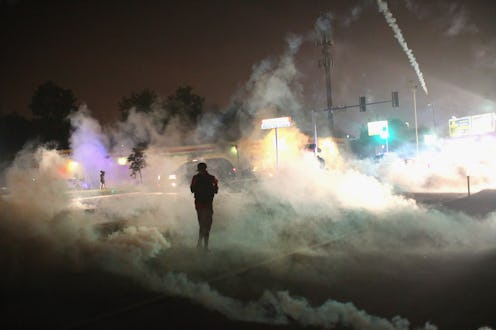News
Amnesty International Lays Into Ferguson
For months, the country has followed along with the impassioned, long-term protests unfolding in the streets of Ferguson, Missouri. Following the death of 18-year-old Michael Brown in early August at the hands of Ferguson Police Officer Darren Wilson, the community has been in a heightened state of awareness and tension, and has often been under a heavy, militarized amount of police presence. And the rest of the world has taken note, as well — an Amnesty International report on Ferguson condemns the police's response to the protests. And it pulls no punches in its assessment, calling the state of affairs in Ferguson from Aug. 14 through Aug. 22 one which infringed the rights of countless peaceful protesters.
It's a hugely significant event — this is the first time the venerable human rights watchdog has examined conditions within the United States. Amnesty International observers were on the ground during that eight-day period, and what they saw was, well, probably pretty similar to watch all of us saw watching livestreams, news coverage, and following along on social media — a largely peaceful protest about police brutality, and the perceived value of black people's lives, being met with teargas and armored vehicles and aimed rifles.
Steven Hawkins, the executive director of Amnesty International USA, summarized the report's findings, and their significance for how we think about repression and rights violations at home, rather than abroad.
What Amnesty International witnessed in Missouri on the ground this summer underscored that human rights abuses do not just happen across borders and oceans. No matter where you live in the world, everyone is entitled to the same basic rights as a human being – and one of those rights is the freedom to peacefully protest. Standing on W. Florissant Avenue with my colleagues, I saw a police force, armed to the teeth, with military-grade weapons. I saw a crowd that included the elderly and young children fighting the effects of tear gas. There must be accountability and systemic change that follows this excessive force.
The full report can be read here, and it's well worth your time, although if you were following the situation in Ferguson closely in mid-August, a lot of it will probably sounds familiar. Titled "On the Streets in America: Human Rights Abuses in Ferguson," it specifically cites what it considers multiple rights violations.
- Local and state police's heavily militarized response to the spontaneous protests, despite President Obama, Attorney General Eric Holder, and Missouri Governor Jay Nixon's admissions that the vast majority of protesters were peaceful.
- The imposition, by Nixon, of a curfew on all Ferguson residents. At the time, Nixon called it a "test" to see if people would calm down and go home. They largely didn't, which preceded yet more tension between the Ferguson public and authorities.
- The insistence by police that protesters not stop and rally in one spot, but rather be forced to "keep walking" in order to evade potential arrest — this sort of policy has the obvious side-effect of making participation harder for less able-bodied protesters, and Amnesty called it a violation of free assembly rights. This tactic was ultimately ruled unconstitutional by a federal judge.
In full, the report is simply too bursting with information to be adequately summarized here — it clocks at about 20 pages, concluding with a list of recommendations for reforms that should be embraced to alleviate the situation. While they're all worth reading, the fourth point on the report's list is especially worth noting.
Ensure that all law enforcement agencies engaged in the policing of protests review their policies in the policing of protests by taking an approach that leads to de-escalation. They should avoid unnecessary escalation through threatening appearance and/or behavior, excessive use of force, inappropriate equipment, and arbitrary arrests. They should seek dialogue with protest organizers, call for calm, and not make public statements which label an entire group of protesters as the enemy of the state, such as “we will fight vandals and criminals.”
You can download the entire report here, in a sharp-looking .PDF file, so if you have a few minutes, be sure to give it a look. Of course, the Ferguson protest movement is far from over now, even over two months later — everyone is still waiting to hear whether a St. Louis-based grand jury will indict Wilson for Brown's killing, or whether he'll be cleared without having to face charges.
Images: Getty Image (3)
